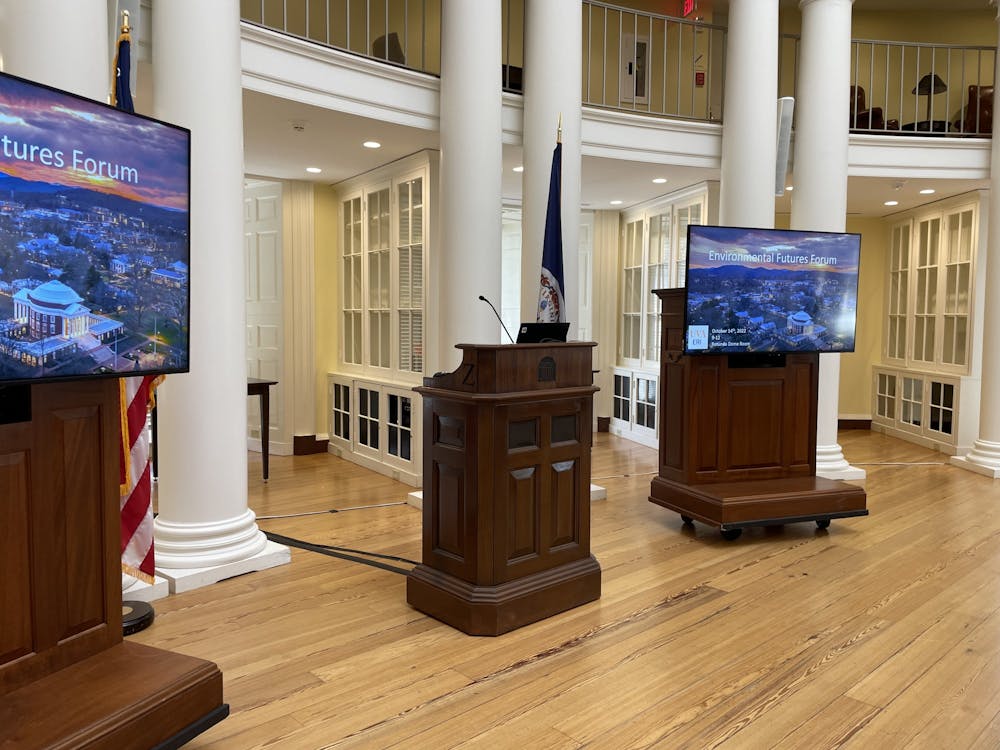Urgency and optimism filled the Rotunda Dome Room Friday morning for the return of the Environmental Resilience Institute’s Environmental Futures Forum. Students and researchers from across the University gathered at the event to hear about a new $60 million investment in environmental resilience and sustainability as part of the Grand Challenges program.
The Grand Challenges program originated from the University’s 2030 Strategic Plan and five key research priorities identified by the community. In opening the event, Provost Ian Baucom alluded to the 2030 Plan’s vision of creating a “great and good” University.
“We can look to the future, and no matter how hard it looks, determine that we will do everything in our power to not let that good future go,” Baucom said. “As we know, President Ryan is calling us to be a good and great University, and I can think of no better way to answer that call than through this work.”
The Institute is focused in particular on extending the University’s impact on clean energy and climate adaptation and mitigation beyond Grounds. In addition to funding the ERI’s new research programs, a portion of the $60 million has been allocated towards faculty hires and Morven Farm’s Sustainability Lab.
Following Baucom’s speech, researchers from six of the University’s schools presented work supported by seed funding from the ERI made possible by the Grand Challenges program. Projects ranged from clean energy and disaster response to a humanitarian book club and a study of water management and business on the Colorado River.
In one such project, faculty in the Hemp CoLab research group — including Engineering Prof. Osman Ozbulut — are designing concrete made from industrial hemp due to hemp’s fast growth and high carbon storage. In effect, this hemp-crete removes carbon from the atmosphere and stores it for the lifetime of the building.
Initial seed funding from the Grand Challenges program in January has enabled the group to begin collaborating and apply for larger grants to continue their work.
“ERI funding is kind of a seed funding that enabled us to come together and get this collaboration lab,” Ozbulut said. “It has been successful in terms of [submitting] proposals for larger [grants].”
Other speakers discussed topics beyond STEM, integrating religious studies, anthropology, business and policy. This includes Religious Studies Prof. Martien Halvorson-Taylor, who has worked with faculty from five other academic departments studying the effects of climate change on culturally significant spaces across the world, from Alaska to Bhutan.
“Through this authentically transdisciplinary work, we are figuring out how to function not as free floating specialists,” Halvorson-Taylor said, “but as a university to reckon in more meaningful ways with the [current human-dominated era].”
Such emphasis on the interdisciplinary guided the other initiatives announced by ERI director and Environmental Science Prof. Kristen McGlathery. The remainder of the $60 million will go towards several grant programs, post-doctoral fellowships aimed at increasing diverse representation and new faculty hires. Additionally, the Climate Collaborative will support several interdisciplinary research teams based in Virginia and across the globe studying climate impacts.
McGlathery also announced a new name for the group — the U.Va. Institute for the Environment — and a new physical location on the Downtown Mall to provide space for events like this in the future.
“We’re also launching these new programs and asking for input from the community,” McGlathery said. “What do you think the big questions are, what are the big needs? Where do you think the opportunities are? Tell us what you think is most important.”
Prioritizing community engagement, the Institute has created a website to solicit public feedback on issues needing to be addressed and possible recipients of ERI funding.
PhD student Mirella Shaban was in attendance at the event.
“I'd be really interested to see if there's any plans or interest in looking at the Middle East in the context of everything that's spoken about here,” Shaban said. “I think that it's very often overlooked when it comes to environmental resilience and just the environment in general.”
Whether abroad or at home, projects funded by the Grand Challenges program and the Environmental Resilience Institute will contribute to climate mitigation and adaptation across the state and globe.







